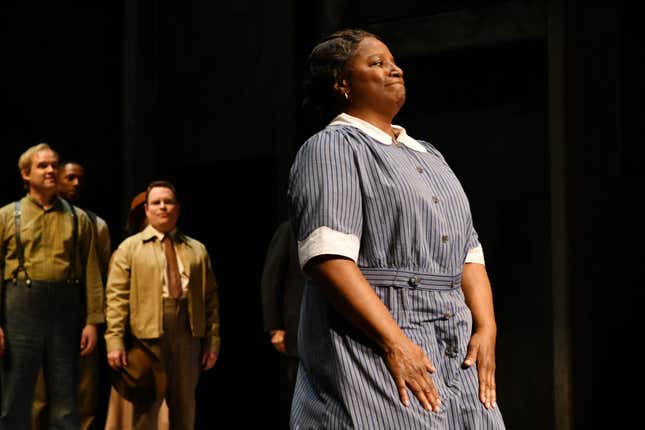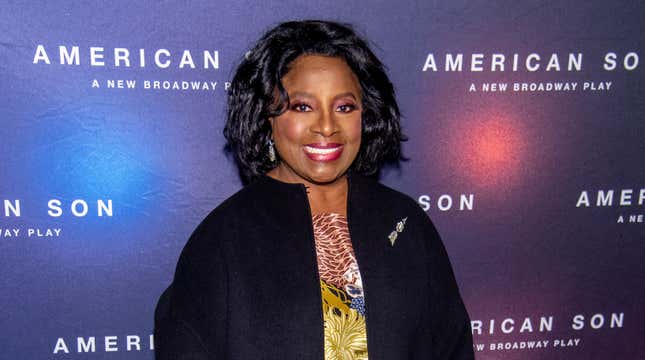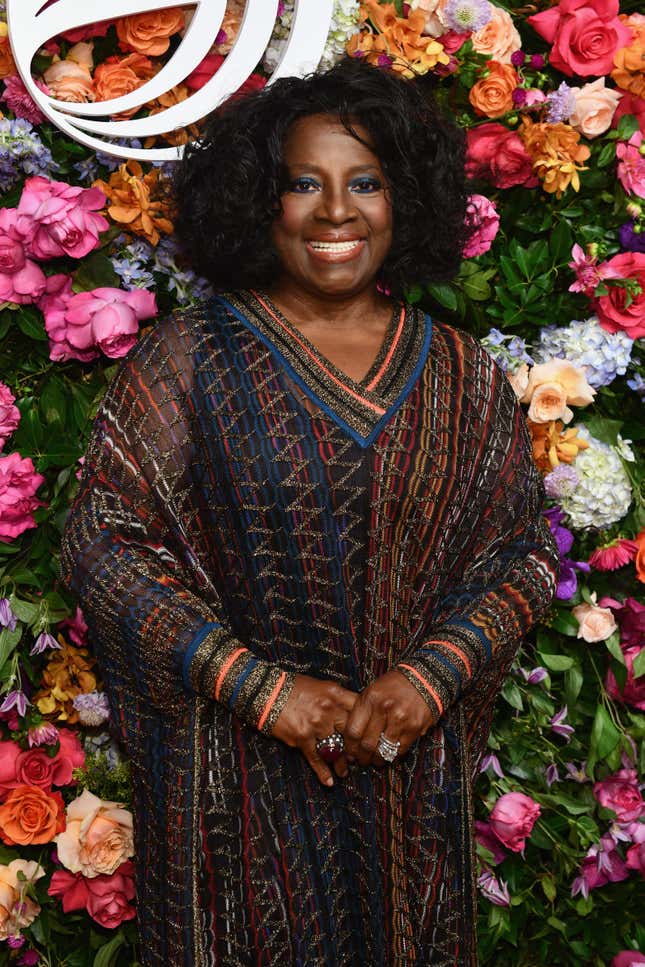
Many know her as one-half of one of Hollywood’s most enduring marriages, but LaTanya Richardson Jackson (wife of Samuel L. Jackson), is an acting powerhouse in her own right. Just ask the audiences currently experiencing her talent nightly in Broadway’s acclaimed production of To Kill a Mockingbird.
Scripted by award-winning writer, producer and director Aaron Sorkin (The West Wing), produced by Hollywood heavyweight Scott Rudin, and directed by Tony winner Bartlett Sher, it’s hard to imagine any actor reluctant to take part in the reimagining of Harper Lee’s Pulitzer Prize-winning tale of racism and injustice in Jim Crow-era Alabama. But as Richardson Jackson recently told The Glow Up, she initially had no interest when asked to return to Broadway in the role of Calpurnia, maid and nanny of the fictional Finch family.
“I was not coming,” the Tony nominee (for 2014's A Raisin in the Sun) recalled with a chuckle. “I really live in LA, and I have a big life. ... And so, I told Scott and Bart, ‘I am not coming to New York to play Mammy. So if you all want to do that, and try to make that thing happen, there are plenty people who can just step into that for you.’”
She continued. “They said, ‘If that was what we were looking for, we wouldn’t be calling you. This is going to be a woman of agency. We are workshopping this so we can find and get this character built.’ And I said, ‘Oh. Well, I’m in. Count me in.’ And that’s what has happened.”
Performing alongside fellow veteran stage and screen actor Jeff Daniels in the role of Atticus Finch and Gbenga Akinnagbe (The Deuce) as Tom Robinson, the black man falsely accused of raping a white woman, Richardson Jackson has garnered raves for her nuanced performance. In a role now elevated from mostly silent and baleful-eyed witness to what Rolling Stone called a “brilliant, bracing” performance, Variety considered Richardson Jackson “in her glory” as Calpurnia, while The New York Times said, “she serves in the play as Atticus’s foil and needling conscience.”
Speaking with Richardson, she tells me it’s authenticity that makes her version of Calpurnia more dimensional than any prior.
“She is more truthful; who she is, is more honest,” she said. “There’s a certain amount of ‘magical negro’ that was in that book—I could feel Harper Lee’s affection for this woman, [so much so] that she tended to make her magical. Which... well, we know our magic—well, some of us do—and it is there. But if you just talk about the magic, and don’t talk about what else was going on that makes [Calpurnia] a full-grown person, human being, woman, then you get a stereotype. You get something that becomes more of a device for you to move your story along, that is just scenery and the sideshow to the main event.”
Finding Calpurnia’s wholeness and humanity were paramount to Richardson Jackson in her portrayal, which she says was in part inspired by her own grandmother.
“The woman I loved most was my grandmother, and she was a maid, and I have such respect and am invested in who these women of service were and are,” she said. “So I just wanted to see whether or not Aaron was going to imbue her with the spirit and the language that would allow her to be seen—to not just be scenery—but allow a voice of what she was thinking, and how she thought, and what her influence really was. … Who she was to those motherless kids, to that wifeless husband, in a time where she couldn’t even get up and have her first thought be her children. So, it was a challenge that I thought I wanted to meet because I’m so interested in the psychology of what we disavow about ourselves as women—and especially African American women.”

Like the slave narrative, it’s a sticking point that has repeatedly arisen in Hollywood, as the painful history of black women being relegated to roles as maids and mammies remains all too fresh (roles that unfortunately historically paralleled many of our real-life options). In recent years, some have sought to distance themselves from that history; even Viola Davis, who was an Oscar nominee for portraying a maid in The Help, has expressed regret over the role.
As the great-granddaughter of a retired domestic worker that I knew and loved, Richardson Jackson and I briefly bonded over our desire to see those narratives given dignity and worth, too. We both grew up in homes that held (or even still hold) remnants of that legacy, whether as antique hand-me-downs from white employers or simply the seemingly tireless care our grandmothers took in tending to their own families and homes in addition to the homes of others.
“Understand this: we still should play maids, because that is part of who we are; that is part of our quilt of living, and there is nothing wrong with that,” Richardson Jackson affirmed. “The fact that those jobs existed and women stepped into them and did the job so well is what we applaud, because they helped raise most of the communities that run this country. So, that’s not a job to be demeaned.
“The fact that we have diversity and choice right now in acting—for certain people, for certain actresses, you’re allowed to do more—that is great. But it’s not the evolution of the part, it’s just the recognition of the much-needed diversity of who we are as women,” she added. “We didn’t just, you know, ‘escape’ from being the maid … we will always play maids. But there’s the infusion of dignity and truth that has been missing in those parts that made people think that this is not something you would want to do … because they didn’t write them that way.”
In workshopping the role, Richardson Jackson encouraged Sorkin to write Calpurnia as a woman in full, sneaking in hints about the character’s family life and religion that had gone ignored prior.
“Because I know the truth,” she said. A self-proclaimed “race person,” she says “our people inspire me. I know that there’s a lot to us.”
“I’m inspired by the everyday people who walk the street and no one sees,” she adds. “Because I’m sitting there, saying, ‘I see you.’”

Citing influences that range from acting titans Cicely Tyson, Diana Sands, Ruby Dee, and Mary Alice, to super-producer Shonda Rhimes and spiritual “sister” Alfre Woodard (for whom she recently stepped in at the last minute to fill a supporting role in Netflix’s Juanita), Richardson Jackson promises her next role will ensure even more of us are seen, as she shifts her focus to producing and directing, with the aim of amplifying more black women’s voices.
“[Hollywood is] always trying to cubbyhole us, and we have to stop allowing it to happen,” she said. Casually, she recalls an anecdote from Obama’s presidency—you know, because the Jacksons have been known to make it onto the Obamas’ guest lists. Following a speech by the then-president, Richardson Jackson made one of her own.
“I said to Barack: ‘Lest we not forget the black women, on whose shoulders the world stands, and whom no one ever sees, because I guess you’re standing so hard you’re pushing us into the ground,’” she recalled. “I was saying it because I don’t know why we are always the last ones thought about. And part of it is because we have allowed ourselves to back up … [but] now is the time. It’s been time; we’re long overdue. And if it’s going to be given, then we have to be a bit more aggressive in announcing who we are and that we’re standing here. Because no one is more deserving than us, and we do know what we’re doing. And if anyone can handle and juggle a whole lot and make it work, it’s black women.”
And while Richardson Jackson is full of ideas on how to continue bringing our stories to stage and screen, at the moment, she’s devoting her presence to bringing Calpurnia to life for a new generation of theatergoers.
“This is where my base is, the theater—the boards, the proscenium, the round—this is me. ... This, I go into, and I’m home,” she said. “And it feels like the best nesting that I can do, so I feel the creative come to me as soon as I’m in the room with it. This is me—the theater, this is me. This is the womb that nurtured me. … I’m home.”

